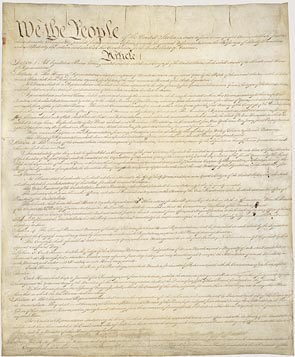Over thirty years ago, I came to Washington DC, and joined the Federal Bureau of Investigation (FBI).
My first job responsibility was to swear a promise to the United States of America, and I said:
“I, Jeffrey Imm, do solemnly swear that I will support and defend the Constitution of the United States against all enemies, foreign and domestic; that I will bear true faith and allegiance to the same; that I take this obligation freely, without any mental reservation or purpose of evasion; and that I will well and faithfully discharge the duties of the office on which I am about to enter.”
I swore this oath, because America cannot afford individuals in law enforcement that cannot defend the law of the land. If you can’t defend the Constitution of the United States, you have no business working for the American people. Amendment 1 of the Constitution supports the freedom of religion for all Americans.
To those who seek to promote human rights, I urge you to consider, can you unquestioningly support the Universal Declaration of Human Rights? How credible are human rights activists that cannot defend the most fundamental international document of our universal human rights?
Article 18 of the Universal Declaration of Human Rights states: “Everyone has the right to freedom of thought, conscience and religion; this right includes freedom to change his religion or belief, and freedom, either alone or in community with others and in public or private, to manifest his religion or belief in teaching, practice, worship and observance.”
Notice Article 18 states “everyone,” not just those we like, those we agree with, or those who are popular. In our international Universal Declaration of Human Rights, there are no caveats creating exceptions to such human rights for Christian churches in Pakistan, for Ahmadiyya Muslim mosques in Indonesia, or even for Muslim mosques in America. Everyone has the right to believe.
This may not always be popular. In America today, there are endless news reports about the unpopularity of mosques in various parts of the country – from California to Florida – that are being protested by those who do not like Islam and by those who seek to challenge some Muslims’ right to worship.
But both law enforcement and human rights activism are really not a popularity contest. Certainly in every case, supporters of both seek popularity. But both are a commitment to a consistent application of the law and our universal human rights for all people – all the time.
Some people won’t like that. They won’t like laws that keep our society safe and civil when it inconveniences them. They won’t like human rights that apply to those that they may not like. They won’t care for those who flout their populist arguments with the law and with our universal human rights.
As a child, I remember the struggle in America for black Americans’ human rights in the 1960s and 1970s. There were plenty who did not like either the laws or the struggle for such human rights. Certainly if you had taken a poll in a nation which once had 4 million members of the Ku Klux Klan, you would have found there were plenty of people who would’ve opposed both the campaigns and the laws granting black Americans their human rights – and this in a nation whose national declaration is founded on equality and liberty. During those tumultuous days, there were protesting mobs that sought to stop racial integration of schools. I remember one populist campaigner Alabama Governor George Wallace whose racial segregationist policies were part of his campaign to seek to become president of the United States, and he had many, many supporters around the country.
I have seen first hand how such bitter disagreements on human rights can divide our nation, our cities, even our families. But we have an obligation to be a UNITED States of America, not just when it is easy, but also when it is difficult, when we have to make unpopular stands to be TRUE to the truths that we hold self-evident – as Americans.
Some people don’t like the law. Some people don’t like human rights. But the law is the law – and our universal human rights are our universal human rights, not just for those we like or people like us, but for everyone.
Today, CNN has now added to the ongoing furor in America on protests against Muslim mosques by doing a poll that shows that a majority of Americans object to a planned Islamic center on Park Place in New York City, about two football fields away from Ground Zero. It is clearly not popular to many people.
Many may not like the exercise of Constitutional rights or human rights by many people. If we took a national poll every time someone did something controversial, we can be certain of the results. But whether we like it or not, Americans and human beings have Constitutional rights and universal human rights. Don’t forget those are your rights too.
We cannot trade away our Constitution and our universal human rights to whatever CNN/Opinion Research Center finds through some telephone calls, what some people post on Facebook, or what some say with protest signs. Imagine if that was you that the nation was judging any time you did something unpopular or controversial. Imagine if that was you whose very freedoms were being assessed by cable television news hosts or the latest talk radio programs. We have the right to do and say things that may be unpopular, that many may disagree with, and that many may believe to be wrong. It is called FREEDOM.
Our Constitution, our law, and our universal human rights are not just toys for angry politicians, angry groups, and sensationalist journalism. Our Constitution, our Declaration, and our law are the foundation of America’s identity. Our Universal Declaration of Human Rights is the commitment of a pact by United Nations’ countries of the world, including the United States of America, after the horror of Adolf Hitler’s Nazi Germany – as their way of saying “Never Again” and creating an international declaration for universal human rights and justice for all – all the time.
I may no longer be a member of the Federal Bureau of Investigation, but my commitment to their goals of Fidelity – Bravery – Integrity to our Constitution and the truths that we hold self-evident that it is based on will not waver.
To those who seek to defy Americans’ Constitutional rights, remember there are those who vowed an oath to continue to defend such Constitutional rights – whether it is popular or not.
We urge all Americans to be consistently responsible for equality and liberty. It is the American way, and it is who and what America is all about.

